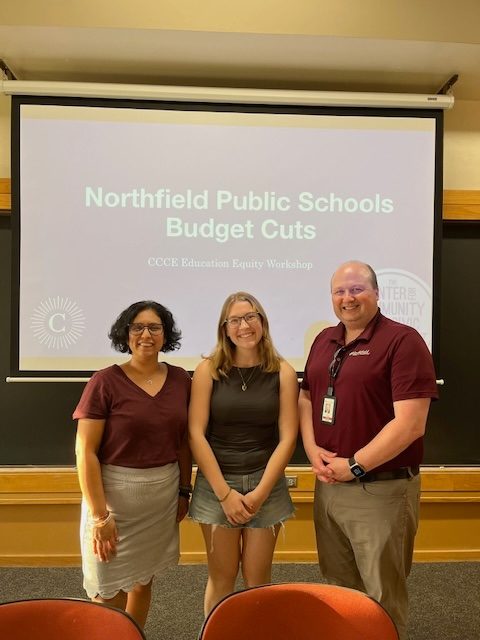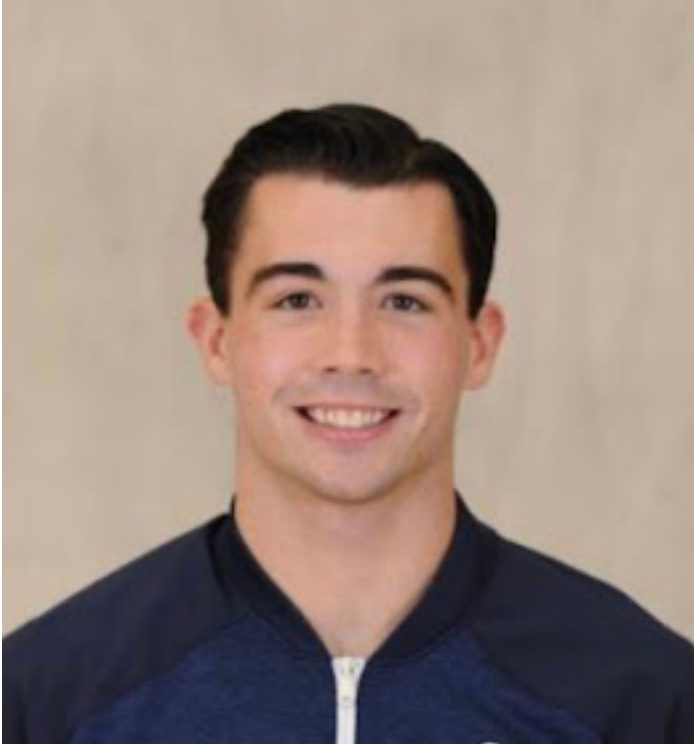How have you been involved in the CCCE?
Sean: I first got involved through CarlsVote towards the end of freshman year. Since CarlsVote was a student-created organization, I really appreciated the resources that the CCCE had to offer and I feel like that really expanded our ability to do stuff on campus. And then I had a summer Public Policy and Marketing internship with Laura Baker Services Association and continued that work through community based work study during the academic term. So through those two experiences, I applied to be a CCCE fellow my senior year. During my senior year, I’ve mostly worked with Reading Partners, which is an organization that connects volunteers with students in elementary schools in Faribault and provides mentorship and tutoring for reading literacy. I’ve also recently worked with Grace on the Legislative Action Committee to advocate for education equity in public schools.
Grace: In high school, I was involved in several volunteering and community organizations and I wanted to continue that work in college. Freshman year I looked at different volunteer opportunities on the CCCE website and I found Waano, an educational after school program for K-12 Somali students in Faribault, which aligned with my public service interests. I began volunteering with the organization freshman year and then sophomore year I wanted to play a leadership role in Waano so I started working as an education equity fellow in the CCCE.
Education equity is one of the core issues areas of the CCCE. Why is it important to you?
Grace: Coming from a public high school, I’ve seen how important public education is in providing resources and equal opportunities to all students, regardless of their background. Northfield is very similar to my hometown, Brookings, South Dakota, so when I learned about the budget cuts it made me reflect on all the opportunities I had through my education and the importance of state funding. That really made me interested in advocating for increased opportunities and funding for students in Northfield.
Sean: I also come from a public school background and I remember growing up in school and finding myself frustrated with the lack of real world resources that school gave you. I remember my sophomore and junior year of high school, my friends and I started this organization to enhance financial literacy at school, because my classmates and I were frustrated that even though we were learning history, math, and science we had no idea how to navigate the real world and not everyone had the resources to talk to their parents about it or weren’t close enough with teachers to talk about it. Advocating for access to knowledge and resources to navigate the real world was very important to me in high school. And then coming to Carleton further emphasized the power of education because Carleton’s definitely transformed my life. It’s emphasized for me how powerful a college education can be—so from personal experience I just really value what education can bring to someone’s life.
Could you describe the work of the Legislative Action Committee and why you wanted to get involved and learn more?
Sean: The Legislative Action Committee is composed of community members in Northfield, like school board members and the superintendent, but also advocates in general around the Northfield community, and they work to enhance resources for students in Northfield Public Schools. I decided to work with the Legislative Action Committee after they reached out to the CCCE and talked about opportunities for us to be involved. I was really appreciative of them reaching out and finding ways that we can partner and work together. Especially given the political climate right now and the widespread attack on education—I felt like now more than ever, it’s really important to get involved and work at the local level to advocate for education equity.
How have you connected Carleton students understanding public school funding, budget cuts, and how to take action?
Grace: We organized two events this term about the issues facing Northfield Public Schools. The first was an email banking event, where we discussed the budget cuts, their impact on current Northfield students, and how these cuts are connected to the Minnesota state budget, as well as providing an email template for students to send to Minnesota state legislators to advocate for public education funds. We also hosted Northfield Superintendent Dr. Matt Hillmann and School Board Chair Claudia Gonzalez-George, who have been influential in organizing community budget recommendation sessions, to discuss the issues facing Northfield schools. Students were able to learn about the causes of the budget cuts and how positive advocacy can help implement change, while having the opportunity to ask questions. We were very pleased with the turnout for the event, as many students had the opportunity to ask questions and learn from our speakers about the causes of the budget cuts, particularly the influence of the lack of affordable housing on declining enrollment rates in Northfield, and how positive advocacy can help implement long-standing change. Matt and Claudia emphasized that advocacy has many forms and students can make change through volunteering at Northfield public schools or pursuing a career in teaching, in addition to emailing state representatives or voting.
What have you learned about advocacy through this work?
Grace: I learned that the results of advocacy don’t always happen overnight and implementing change is a long process. Even with our work organizing the email bank and sending letters to our state representatives it won’t impact the Northfield budget cuts for next year—that’s set in place. However, our efforts can help for the future years and can help address the longstanding issues that are facing public education. Because of this work, I had to change my mindset to realize advocacy is a long-term commitment—it’s not just within the span of a term or two terms but rather a commitment that lasts years.
Sean: I have two major takeaways. One is the importance of coalition building and that advocacy just takes a lot of community outreach and work with other people. My second takeaway is that advocacy is so broad and can take many forms. Anyone truly can get involved and advocacy can show up in many different ways, whether that’s doing an email bank or calling your legislators or even going to a protest—there’s different ways to get involved and different ways to advocate. I also learned how to do some of this through my work with Laura Baker—I wrote a lot of email templates to legislators and sent those out to people and also did some legislative tracking, which is another very useful skill that I’ve then been able to use for my own interests in politics.

